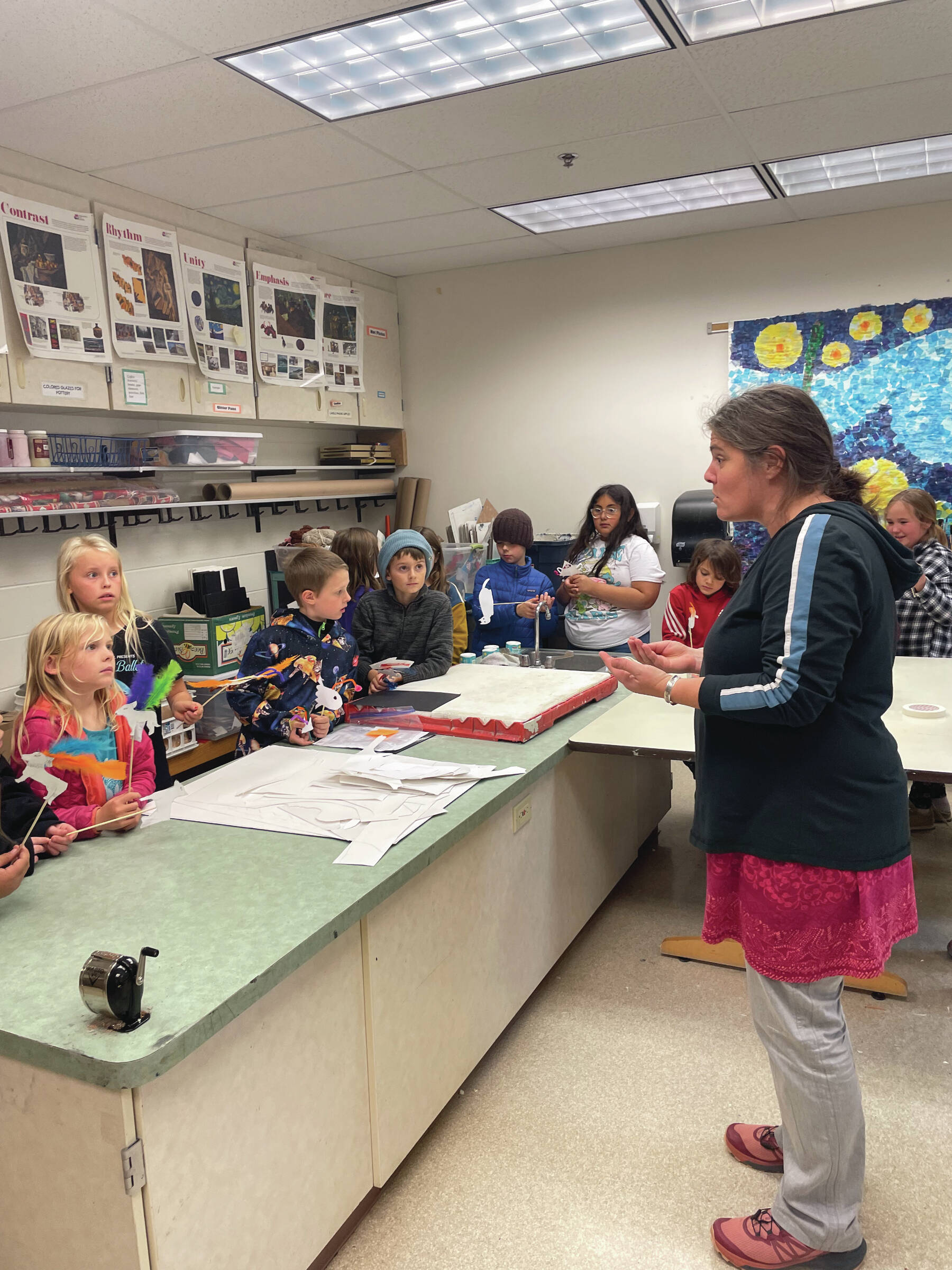By Emilie Springer
Homer News
Bunnell Street Arts Center started the arts month of October off with two celebrations of puppets. One is a performance team visiting from Vermont and the second is an artist-in-residence.
Visiting puppet artists
At the beginning of the month two artists, Shoshana Bass and Sarah Nolen, from the Sandglass Theater in Putney, Vermont, visited Homer for an artist talk and featured showing of “Feral,” a work in progress puppet play at Bunnell on Oct. 4.
“Feral” is described on the Bunnell website as “a wolf-who-is-no-longer-a-wolf returns to the forest, within her the violation of domestication, a claim of ownership on her body. She yearns for instincts of which she feels only traces. This is a story of disruption within a woman’s life when the wolf inside her howls, and the possibilities of reintegration with that feral voice.”
Bass and Nolen also conducted interviews with Homer artists on the topic of visions and interpretations of the local environment and how their bodies are physically impacted through those interactions.
The puppeteers will return to Homer in the summer of 2025 for a show they have been working on for several years to incorporate some of the information gathered during the local interviews. In addition to the interviews from Homer, Bass and another research partner, Paulina Mendez, have collected interview stories from women internationally.
“We’re exploring the relationship between domestication and wildness, specifically around women and how this plays out in or on women’s bodies,” Bass said.
There is an academic component to this that Bass refers to as “embodied knowledge” and how this impacts personal memory.
“It’s a study of the difference between intuitive knowledge and scientific knowledge.”
Bass was born into the field of puppetry; her parents were the founders of Sandglass Theater. Her father is originally from New York City and her mother is from Germany. Both began their own theater careers as part of a touring company before founding Sandglass, a theater constructed from a renovated barn.
Bass describes her hometown in Vermont, Putney, as a rural community — the population is approximately 2,500 people — with many similar features as Homer, including a dedication to the arts.
During their brief visit to Homer, Bass and Nolen were able to visit Pier One Theatre, where they hope to present the full-scale show next summer. Specific dates for the 2025 performance are not established yet. Bass said there is still some additional funding that needs to be confirmed to bring the final version of “Feral” on tour.
Bass said she was connected to Asia Freeman with the Bunnell Street Arts Center through the National Performance Network. Together, Freeman and Bass share the opinion that “there’s such an important story that lives in rural spaces that needs to be part of the national arts dialogue and needs to be part of how we talk about equity in the arts and how we create,” Bass said.
Agopian residency
Also this month, Fairbanks artist and puppeteer Maite Agopian will complete a monthlong residency at Bunnell, during which she is hosting shadow puppet workshops for students at Fireweed Academy, providing adult workshops at Bunnell and participating in Bunnell’s Film Jam.
Agopian has been living in Fairbanks for 20 years but is originally from Switzerland. She officially started studying puppetry in 2017. She said it is something she had always dreamed of doing and started taking classes any way that she could. She said growing up in Europe experiencing puppetry is a “very cultural thing; it’s something you see everywhere from the time you’re very young.”
She noted that for youth there are theater puppets and street puppeteers but the art exists at adult venues as well.
“I’ve always loved the art; it is fascinating,” she said.
Prior to her dedication to puppetry, Agopian worked in education and museum arts. She said that in the museum, she was always considering, “how an object can tell a story. What can we do it give it a voice and make it be more animate?”
Other helpful museum skills that have influenced her efforts in puppetry include: learning how to work with children, how to create a workshop, as well as all of the administration components of the trade, she said.
Much of Agopian’s work is in shadow puppetry. “I like to do shadow because it’s very experimental and you can use any kind of object or material. It’s fun.”
She said that because puppeteer is behind a screen, “it’s a very dreamy kind of puppetry.”
Agopian said she also likes the craft of puppetry and enjoys making puppets out of wood, mentioning specifically marionettes. She said it takes a lot of time to work in both craft and performance, but she enjoys them both.
For the adult workshops, Agopian intends to work with the theme of the local environment. One of the things that inspired her when she came to Homer was the similarity between the mountains and Kachemak Bay and the mountains of Switzerland and Lake Geneva, a 224-square-foot lake shared between France and Switzerland that is one of the largest in Europe.
Her adult workshops will revolve around the role of memory.
Registration for these events is limited and is available through the Bunnell website (www.bunnellarts.org) or at the gallery.
Workshop participants will “explore different aspects of shadow puppetry/theater while considering the use of light, materials and shadows to evoke wonder and magic,” according to the website description.
The Film Jam event that Agopian will contribute to will be held on Oct. 26 at Bunnell and is curated by Michael Walsh. The Bunnell website describes the presentation as “an evening of single-channel and multi-channel projection cinema, alongside performance, storytelling and music by some of Homer’s most adventurous makers.”
More details and tickets are available on the gallery website.


